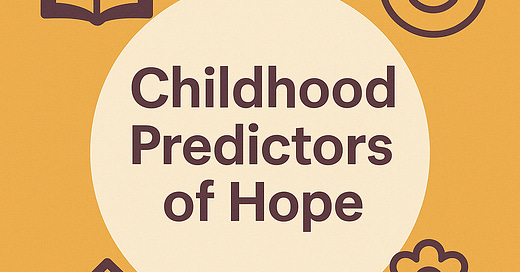New Global Study Finds Childhood Experiences Shape Adult Hope – But Cultural Context Matters
Cross-National Analysis of Hope Across Cultures
I am excited to share that our new paper, “Seeds of Hope: Cross-National Analysis of Childhood Predictors of Hope in 22 Countries,” has just been published in Applied Research in Quality of Life.
This is the largest study to date on #HOPE. The analysis draws on data from over 202,000 people across 22 countries as part of the Global Flourishing Study.
A note of gratitude to all of my colleagues and friends that contributed their time and resources to making this study possible (in no particular order): Tyler VanderWeele, Byron R. Johnson, Richard Cowden, Kate Long, Charlotte VanOyen-Witvliet, Cristina Gibson, Alicia Cortright, James Walsh, Emily Purcell, Garzon Fernando, Bill Hathaway.
We examined how early-life experiences shape hope in adulthood. We found compelling evidence that hope is not just an individual trait—it is cultivated early, in the soil of healthy, relational, stable, and spiritual upbringing.
For example found that:
1). Excellent childhood health emerged as the strongest global predictor of adult hope.
2). Supportive parental relationships—especially with fathers—were consistently linked to higher levels of hope.
3). Regular childhood attendance at religious services predicted more hope in adulthood, particularly in countries where religious life is a cultural mainstay.
4). Adverse experiences like childhood abuse or feeling like an outsider were strongly and uniformly associated with reduced hope.
5). Significant variation existed across countries—suggesting that culture, economy, and social norms influence how childhood shapes hope.
Hope Grows Differently Around the World.
We learned that what works in one nation doesn’t always translate elsewhere:
6). In Sweden, children who attended religious services weekly were significantly more hopeful adults—contrary to expectations for a secular country.
7). In Argentina, the same pattern wasn’t observed—religious attendance showed virtually no impact on adult hope.
8). In Poland, parental divorce predicted significantly lower hope in adulthood, while in Sweden, it was associated with higher hope—perhaps reflecting differences in stigma, family support systems, or welfare infrastructure.
9). In India, the impact of excellent childhood health on adult hope was minimal, while it was substantial in countries like Japan and Germany—pointing to differing healthcare access, cultural health beliefs, and social safety nets.
This study is part of the #GlobalFlourishingStudy, and its implications are global and practical:
First, we MUST invest in early health, safe family environments, and inclusive communities.
Second, educators MUST recognize the long-term impact of early support and exclusion.
Third, faith-based organizations MUST understand their ongoing influence in shaping a child’s worldview and resilience.
I hope that we can continue to pursue more culturally sensitive and context-aware models of hope. And that these findings inspire new conversations—and action—on how we support children today to build a more hopeful future tomorrow.
Read the full paper (also download the supplementary files).
—
Citation
Counted, V., Long, K., Cowden, R., Witvliet, C. V., Cortright, A., Gibson, C., Walsh, J., Hathaway, W., Fernando, G., Johnson, B.R., & VanderWeele, T. J. (2025). Seeds of Hope: A Cross-National Analysis of Childhood Predictors of Hope in 22 Countries. Applied Quality of Life Research https://doi.org/10.1007/s11482-025-10450-0




